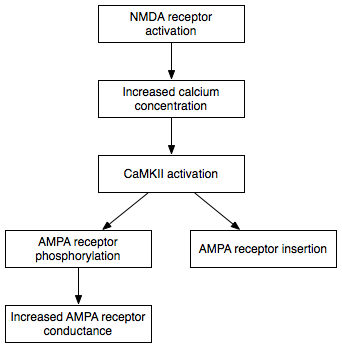|
Overgeneral Autobiographical Memory
Overgeneral autobiographical memory (OGM) is an inability to retrieve specific memories from one's autobiographical memory.Williams, J. M. G. & Broadbent, K. (1986). Autobiographical memory in suicide attempters. Abnormal Psychology, 95, 144-149. Instead, general memories are recalled, such as repeated events or events occurring over broad periods. For example, when asked to recall a happy event, a person who exhibits OGM may say, "when I was on vacation last month" instead of remembering a single incident, such as, "my high school graduation."Sumner, J. A., Griffith, J. W., & Mineka, S. (2010). Overgeneral autobiographical memory as a predictor of the course of depression: a meta-analysis. Behaviour Research and Therapy, 48, 614-625. Research shows a correlation between OGM and certain mental illnesses, such as major depressive disorder (MDD) and posttraumatic stress disorder (PTSD).Williams, J. M. G., Barnhofer, T., Crane, C., Hermans, D., Raes, F., Watkins, E., & Dalgleish, T. ... [...More Info...] [...Related Items...] OR: [Wikipedia] [Google] [Baidu] |
Autobiographical Memory
Autobiographical memory is a memory system consisting of episodes recollected from an individual's life, based on a combination of episodic (personal experiences and specific objects, people and events experienced at particular time and place) and semantic (general knowledge and facts about the world) memory.Williams, H. L., Conway, M. A., & Cohen, G. (2008). Autobiographical memory. In G. Cohen & M. A. Conway (Eds.), Memory in the Real World (3rd ed., pp. 21-90). Hove, UK: Psychology Press. It is thus a type of explicit memory. Formation Conway and Pleydell-Pearce (2000) proposed that autobiographical memory is constructed within a self-memory system (SMS), a conceptual model composed of an autobiographical knowledge base and the working self. Autobiographical knowledge base The autobiographical knowledge base contains knowledge of the self, used to provide information on what the self is, what the self was, and what the self can be. This information is categorized into three b ... [...More Info...] [...Related Items...] OR: [Wikipedia] [Google] [Baidu] |
Anxiety Disorder
Anxiety disorders are a cluster of mental disorders characterized by significant and uncontrollable feelings of anxiety and fear such that a person's social, occupational, and personal function are significantly impaired. Anxiety may cause physical and cognitive symptoms, such as restlessness, irritability, easy fatiguability, difficulty concentrating, increased heart rate, chest pain, abdominal pain, and a variety of other symptoms that may vary based on the individual. In casual discourse, the words ''anxiety'' and ''fear'' are often used interchangeably. In clinical usage, they have distinct meanings: anxiety is defined as an unpleasant emotional state for which the cause is either not readily identified or perceived to be uncontrollable or unavoidable, whereas fear is an emotional and physiological response to a recognized external threat. The umbrella term ''anxiety disorder'' refers to a number of specific disorders that include fears (phobias) or anxiety symptoms. There a ... [...More Info...] [...Related Items...] OR: [Wikipedia] [Google] [Baidu] |
Rumination (psychology)
Rumination is the focused attention on the symptoms of one's distress, and on its possible causes and consequences, as opposed to its solutions, according to the ''Response Styles Theory'' proposed by Nolen-Hoeksema (1998). Because the Response Styles Theory has been empirically supported, this model of rumination is the most widely used conceptualization. Other theories, however, have proposed different definitions for rumination. For example, in the ''Goal Progress Theory'', rumination is conceptualized not as a reaction to a mood state, but as a "response to failure to progress satisfactorily towards a goal". As such, both rumination and worry are associated with anxiety and other negative emotional states; however, its measures have not been unified. Multiple tools exist to measure ruminative thoughts. Treatments specifically addressing ruminative thought patterns are still in the early stages of development. Theories Response styles theory Response styles theory (RST) ... [...More Info...] [...Related Items...] OR: [Wikipedia] [Google] [Baidu] |
Self-esteem
Self-esteem is confidence in one's own worth or abilities. Self-esteem encompasses beliefs about oneself (for example, "I am loved", "I am worthy") as well as emotional states, such as triumph, despair, pride, and shame. Smith and Mackie (2007) defined it by saying "The self-concept is what we think about the self; self-esteem, is the positive or negative evaluations of the self, as in how we feel about it." Self-esteem is an attractive psychological construct because it predicts certain outcomes, such as academic achievement, happiness, satisfaction in marriage and relationships, and criminal behavior. Self-esteem can apply to a specific attribute or globally. Psychologists usually regard self-esteem as an enduring personality characteristic (''trait self-esteem''), though normal, short-term variations (''state self-esteem'') also exist. Synonyms or near-synonyms of self-esteem include: self-worth, self-regard, self-respect, and self-integrity. History The concept of self-estee ... [...More Info...] [...Related Items...] OR: [Wikipedia] [Google] [Baidu] |
Hierarchy
A hierarchy (from Greek: , from , 'president of sacred rites') is an arrangement of items (objects, names, values, categories, etc.) that are represented as being "above", "below", or "at the same level as" one another. Hierarchy is an important concept in a wide variety of fields, such as architecture, philosophy, design, mathematics, computer science, organizational theory, systems theory, systematic biology, and the social sciences (especially political philosophy). A hierarchy can link entities either directly or indirectly, and either vertically or diagonally. The only direct links in a hierarchy, insofar as they are hierarchical, are to one's immediate superior or to one of one's subordinates, although a system that is largely hierarchical can also incorporate alternative hierarchies. Hierarchical links can extend "vertically" upwards or downwards via multiple links in the same direction, following a path. All parts of the hierarchy that are not linked vertically to one ano ... [...More Info...] [...Related Items...] OR: [Wikipedia] [Google] [Baidu] |
Executive Functions
In cognitive science and neuropsychology, executive functions (collectively referred to as executive function and cognitive control) are a set of cognitive processes that are necessary for the cognitive control of behavior: selecting and successfully monitoring behaviors that facilitate the attainment of chosen goals. Executive functions include basic cognitive processes such as attentional control, cognitive inhibition, inhibitory control, working memory, and cognitive flexibility. Higher-order executive functions require the simultaneous use of multiple basic executive functions and include planning and fluid intelligence (e.g., reasoning and problem-solving). Executive functions gradually develop and change across the lifespan of an individual and can be improved at any time over the course of a person's life. Similarly, these cognitive processes can be adversely affected by a variety of events which affect an individual. Both neuropsychological tests (e.g., the Stroop test ... [...More Info...] [...Related Items...] OR: [Wikipedia] [Google] [Baidu] |
Autobiographical Memory
Autobiographical memory is a memory system consisting of episodes recollected from an individual's life, based on a combination of episodic (personal experiences and specific objects, people and events experienced at particular time and place) and semantic (general knowledge and facts about the world) memory.Williams, H. L., Conway, M. A., & Cohen, G. (2008). Autobiographical memory. In G. Cohen & M. A. Conway (Eds.), Memory in the Real World (3rd ed., pp. 21-90). Hove, UK: Psychology Press. It is thus a type of explicit memory. Formation Conway and Pleydell-Pearce (2000) proposed that autobiographical memory is constructed within a self-memory system (SMS), a conceptual model composed of an autobiographical knowledge base and the working self. Autobiographical knowledge base The autobiographical knowledge base contains knowledge of the self, used to provide information on what the self is, what the self was, and what the self can be. This information is categorized into three b ... [...More Info...] [...Related Items...] OR: [Wikipedia] [Google] [Baidu] |
Negative Reinforcer
In behavioral psychology, reinforcement is a consequence applied that will strengthen an organism's future behavior whenever that behavior is preceded by a specific antecedent stimulus. This strengthening effect may be measured as a higher frequency of behavior (e.g., pulling a lever more frequently), longer duration (e.g., pulling a lever for longer periods of time), greater magnitude (e.g., pulling a lever with greater force), or shorter latency (e.g., pulling a lever more quickly following the antecedent stimulus). The model of self-regulation has three main aspects of human behavior, which are self-awareness, self-reflection, and self-regulation. Reinforcements traditionally align with self-regulation. The behavior can be influenced by the consequence but behavior also needs antecedents. There are four types of reinforcement: positive reinforcement, negative reinforcement, extinction, and punishment. Positive reinforcement is the application of a positive reinforcer. Negati ... [...More Info...] [...Related Items...] OR: [Wikipedia] [Google] [Baidu] |
Coping (psychology)
Coping refers to conscious strategies used to reduce unpleasant emotions. Coping strategies can be cognitions or behaviours and can be individual or social. Theories of coping Hundreds of coping strategies have been proposed in an attempt to understand how people cope. Classification of these strategies into a broader architecture has not been agreed upon. Researchers try to group coping responses rationally, empirically by factor analysis, or through a blend of both techniques. In the early days, Folkman and Richard Lazarus, Lazarus split the coping strategies into four groups, namely problem-focused, emotion-focused, support-seeking, and meaning-making coping. Weiten has identified four types of coping strategies:Weiten, W. & Lloyd, M.A. (2008) ''Psychology Applied to Modern Life (9th ed.)''. Wadsworth Cengage Learning. . appraisal-focused (adaptive cognitive), problem-focused (adaptive behavioral), emotion-focused, and occupation-focused coping. Billings and Moos added avoid ... [...More Info...] [...Related Items...] OR: [Wikipedia] [Google] [Baidu] |
Recall (memory)
Recall in memory refers to the mental process of retrieval of information from the past. Along with encoding and storage, it is one of the three core processes of memory. There are three main types of recall: free recall, cued recall and serial recall. Psychologists test these forms of recall as a way to study the memory processes of humansrecall. (2010). In Encyclopædia Britannica. Retrieved March 04, 2010, from Encyclopædia Britannica Online: http://www.britannica.com/EBchecked/topic/493353/recal/ref> and animals. Two main theories of the process of recall are the two-stage theory and the theory of Encoding specificity principle, encoding specificity. Theories Two-stage theory The ''two-stage theory'' states that the process of recall begins with a search and retrieval process, and then a decision or recognition process where the correct information is chosen from what has been retrieved. In this theory, recognition only involves the latter of these two stages, or processes, ... [...More Info...] [...Related Items...] OR: [Wikipedia] [Google] [Baidu] |
Encoding (memory)
Memory has the ability to encode, store and recall information. Memories give an organism the capability to learn and adapt from previous experiences as well as build relationships. Encoding allows a perceived item of use or interest to be converted into a construct that can be stored within the brain and recalled later from long-term memory. Working memory stores information for immediate use or manipulation which is aided through hooking onto previously archived items already present in the long-term memory of an individual. History Encoding is still relatively new and unexplored but origins of encoding date back to age old philosophers such as Aristotle and Plato. A major figure in the history of encoding is Hermann Ebbinghaus (1850–1909). Ebbinghaus was a pioneer in the field of memory research. Using himself as a subject he studied how we learn and forget information by repeating a list of nonsense syllables to the rhythm of a metronome until they were committed to his m ... [...More Info...] [...Related Items...] OR: [Wikipedia] [Google] [Baidu] |
Eating Disorders
An eating disorder is a mental disorder defined by abnormal eating behaviors that negatively affect a person's physical or mental health. Only one eating disorder can be diagnosed at a given time. Types of eating disorders include binge eating disorder, where the patient eats a large amount in a short period of time; anorexia nervosa, where the person has an intense fear of gaining weight and restricts food or overexercises to manage this fear; bulimia nervosa, where individuals eat a large quantity (binging) then try to rid themselves of the food (purging); pica, where the patient eats non-food items; rumination syndrome, where the patient regurgitates undigested or minimally digested food; avoidant/restrictive food intake disorder (ARFID), where people have a reduced or selective food intake due to some psychological reasons (see below); and a group of other specified feeding or eating disorders. Anxiety disorders, depression and substance abuse are common among people with ... [...More Info...] [...Related Items...] OR: [Wikipedia] [Google] [Baidu] |

.jpg)






